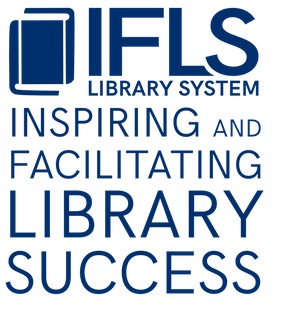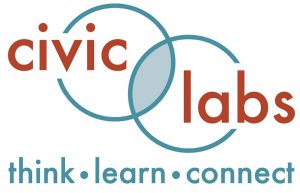Civic Labs
What is Civic Labs programming?
Civic Labs is a catchy way of labeling programming that is about civic engagement. That can look a lot of different ways, and can be excellent for all ages. Here are a few examples:
- Presentations, either by a panel or an expert on important local, regional, and national civic issues–things like water quality, access to healthcare, race/racism/antiracism, climate change, responses to drug use, child welfare, and just about anything else you can think of.
- Facilitated discussions about important local, regional, and national civic issues, where people get a chance to practice having conversations about challenging topics in a respectful way.
- Programming around a One Community/One Book project that encourages deepening understanding of civic issues and chances to connect and interact about them.
- Interactive displays that allow people to voice their opinions about various community or other issues.
- Opportunities to learn about local/state/federal government, including chances to learn about voting, candidates, and running for office.
Finding and training facilitators
It is easier to facilitate a productive conversation if there is a person who is designated as a facilitator. Even better if that person has received some training in navigating challenging conversations with groups. Here are some tips for finding a partner:
- Is there someone on the library staff who can get training? Are you interested in getting training or learning about facilitation? Or is there a neighboring library who you can cooperate with?
- The American Library Association’s Leading Conversations in Small and Rural Libraries: Facilitation Guide; as well as a free e-course (registration required, but no membership requirements).
- The Community Tool Box is a service of the Center for Community Health and Development at the University of Kansas. Chapter 16, Group Facilitation and Problem Solving, “Developing Facilitation Skills” explains how to plan for a good facilitation process and create an environment conducive for conversation.
- University of Wisconsin-Madison Extension staff are often very well trained in facilitation. Check with your county.
- The League of Women Voters often holds community forums, and may have suggestions for facilitators who could work with you (or may be interested in co-sponsoring a discussion/event).
- Braver Angels‘ mission is to “Bring Americans together to bridge the partisan divide and strengthen our democratic republic.” They are a source for possible partnerships, as well as resources, guides, and training.
Finding great panelists and experts to present about current events and/or challenging issues
Look for resources within your community or surrounding areas. Some organizations/agencies that might have suggestions for presenters, or even have presenters themselves:
- Your county’s University of Wisconsin-Madison Extension agents have expertise and connections related to family living, community development, agriculture, and more.
- Our region is rich with colleges and universities! Professors, graduate students, student groups, other staff members—all are good people to tap for panelists or presenters
- University of Wisconsin-Madison Badger Talks
- UW-Eau Claire (including Barron County)
- UW-Stout
- UW-River Falls
- Chippewa Valley Technical College
- Northwoods Technical College
- Local schools—teachers, counselors
- County/city agencies: public health, social services, zoning, planning, solid waste, etc. may have staff or board members who are knowledgeable about a topic
- Community organizations (in your community or nearby) such as:
- Mental health providers
- Other health providers
- Local service clubs (Jaycees, Rotary, League of Women Voters) may have suggestions or experts
- Advocacy groups (LGBTQ Centers, Wisconsin Farmers Union, National Alliance for the Mentally Ill, etc. often have a speaker’s bureau, or someone who can talk about topics)
- Churches (often they are involved in various projects in the community)
- Have library staff pool resources and ideas for possible panelists!
Communicating with presenters and panelists
Be sure to be clear on everyone’s expectations, so there are fewer surprises on the day of the event. Some things to remember:
- Be clear time/date of the program, when they should arrive, and the amount of time you expect the person to speak. Be sure to allow time for discussion/questions if possible.
- Tell presenters what to watch for from the designated time-keeper (and don’t forget to designate a time-keeper!).
- Make sure the presenters or panelists understand the ground rules you have for other participants ahead of time. They may have others to suggest or add.
- Make sure you know who is responsible for what: who will discuss the ground rules? Or will the expert? Who will moderate questions?
- Have a clear understanding ahead of time what kinds of technical needs and other support the presenter will need (equipment, etc.)
- Find out if the presenter/panelist needs any accommodations in order to present.
- Consider creating a presenter agreement, just so everyone understands what each party is agreeing to—this can be helpful ahead of time, and also to use as a reference point if there is a breakdown in communication before, during, or after the program.
- Sample presenter agreements:
Ground Rules
It makes for a better discussion if it is clear what the expectations are ahead of time for all participants. There are many models of ground rules, most boil down to the need to listen, respect others, and be engaged. Be sure to discuss the ground rules at the beginning of each Civic Lab program, and refer back to the rules if necessary. You might find it useful to have business-sized cards to hand out to participants as a reminder.
Here are a few options of ground rules:
Nine Tools of Civility (Marinette County Libraries and UW Extension)
- Pay attention: Be aware and attend to the world and people around you
- Listen: Focus on others in order to better understand their points of view
- Be inclusive: Welcome all groups of citizens working for the greater good of the community
- Don’t gossip: And don’t accept it when others choose to do so
- Show respect: Honor other people and their opinions, especially in the midst of a disagreement
- Be agreeable: Look for opportunities to agree. Don’t contradict just to do so.
- Apologize: Be sincere and repair damaged relationships
- Give constructive criticism: When disagreeing, stick to the issues and don’t make a personal attack
- Take responsibility: Don’t shift responsibility and blame onto others
Tools of Civility on 3×5-sized cards
Institute for Civic Discourse and Democracy—Kansas State University
- Seek understanding and common ground
- Expect and explore conflicting viewpoints
- Give everyone the opportunity to speak
- Listen respectfully and thoughtfully
- Appreciate communication differences
- Stay focused on issues
- Respect time limits
Institute for Civic Discourse Ground Rules on 3×5-sized cards
Zeidler Center for Public Discussion (Milwaukee)
- I’ll speak for myself, from my personal experience. I won’t represent or categorize whole groups of people, or ask others to do so.
- I’ll be specific, and avoid sweeping generalizations in favor of connecting what I know to personal experiences and specific sources of information.
- I will not criticize the views of other participants or attempt to convince them.
- I’ll share airtime, not interrupting, and pass if I’m not ready or willing to respond.
- Following the dialogue, I’ll speak about what happened in ways that don’t identify others.
Zeidler Center Ground Rules on 3×5-sized cards
University of Michigan
- Listen respectfully, without interrupting
- Listen actively, and with an ear to understanding others’ views
- Don’t just think about what you’ll say when someone else is finished talking
- Use attentive body language to show you are listening
- Criticize ideas, not individuals
- Avoid blame, speculation, and inflammatory language
- Allow everyone the chance to speak—share responsibility for including all voices. If you have much to say, try to hold back a bit; if you are hesitant to speak, look for opportunities to contribute
- Avoid assumptions or generalizations about social groups, and do not ask individuals to speak for their perceived group
- Be courteous-don’t engage in private conversations while others are speaking
- Trust that people are doing the best they can
University of Michigan Ground Rules on 3×5-sized cards
Issue guides
The National Issues Forum Institute publishes and distributes an ongoing series of Issue Guides and videos for thoughtful discussion of many of today’s thorniest problems.
The National Coalition for Dialogue & Deliberation is a network of thousands of innovators who bring people together across divides to tackle today’s toughest challenges.
Everyday Democracy provides videos and other resources plus discussion guides on a variety of topics.
Braver Angels has a Guidebook for 1:1 Discussions, Workshops, Debates, and more.
Answers to the question “Why is the library providing programming like this?”
The most powerful argument comes from your library’s mission and vision statements, if you have them. Civic Lab programming fits in well with most library mission/vision statements, and that makes it easy to explain why you provide this type of programming. Look for words and phrases like:
- Lifelong learning
- Educational experiences
- Ideas and information
- Bringing people together
- Depending on the questioner, you could point to these other reasons:
- Looking at the quality of civic discourse in our country (or lack thereof), it is easy to see that we need to provide practice and opportunities for people to come together to discuss difficult topics in a facilitated way.
- Providing people with information and resources about topics from a variety of perspectives fits with age-old library roles.
Preparing for challenges: Program Policies
You can never predict for sure when a program topic will trigger a negative response from a member of the public—or a group. It is good to be prepared for a challenge to your program. Like a Collection Development Policy, a Program Policy can:
- Help guide staff decisions about program development
- Provide an explanation/back-up to explain why a particular library program has been developed
- Clarify that the library does not necessarily endorse what speakers, presenters, or participants say in a program; and that presenters will not be excluded from consideration because of their views or possible controversy
- Provide a course of action in case someone wants to lodge a formal complaint or a request for reconsideration of a program
If you are looking for help creating a programming policy, refer to the Policy Examples resource on the IFLS website, which includes examples and a template for program policies.
The ALA Office for Intellectual Freedom also has resources about programming, including potentially controversial programming.

